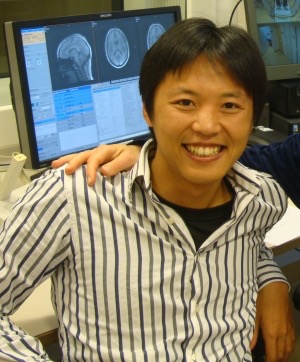The relational process of emotion, social perception, and self-image
Chiu C.-D., Lo, A. P.-K., Mak, F. K.-L., Hui, K.-H., Lynn, S. J., & Cheng, S.-K. (2023). Remember walking in their shoes? The relation of self-referential source memory and emotion recognition. Cognition and Emotion. Advance online publication.
Chiu, C.-D., Siu, C. Y., Ng, H. C., & Baldwin, M. W. (2021). Visuospatial perspective shifting and relational self-association in dispositional shame and guilt. Consciousness and Cognition, 92, 103140
Yeh, Y.-Y., Wang, C.-C., Cheng, S.-k., & Chiu, C.-D. (2021). Dissociation of posture remapping and cognitive load in level-2 perspective-taking. Cognition, 214, 104733
Chiu, C.-D., Ng, H. C., Kwok, W. K., & Tollenaar, M. (2020). Feeling empathically toward other people and the self: The role of perspective shifting in emotion sharing and self-reassurance. Clinical Psychological Science, 8, 169-183.
van Schie, C. C., Chiu, C.-D., Rombouts, S. A. R. B., Heiser, W. J., & Elzinga, B. M. (2019). When I relive a positive me: Vivid autobiographical memories facilitate autonoetic brain activation and enhance mood. Human Brain Mapping, 40, 4859-4871.
Chiu, C.-D., & Yeh, Y.-Y. (2018). In your shoes or mine? Shifting from other to self perspective is vital for emotional empathy. Emotion, 18, 39-45.
van Schie, C. C., Chiu, C.-D., Rombouts, S. A. R. B., Heiser, W. J., & Elzinga, B. M. (2018). When compliments don’t hit but critiques do: An fMRI study into self-esteem and self-knowledge in processing social feedback. Social Cognitive and Affective Neuroscience, 13, 404–417.
The neurocognitive underpinnings of trauma-spectrum disorders
Self- and other-representation (social cognition)
van Schie, C. C., Chiu, C.-D., Rombouts, S. A. R. B., Heiser, W. J., & Elzinga, B. M. (2022). Finding a positive me: Affective and neural insights into the challenges of positive autobiographical memory reliving in borderline personality disorder. Behaviour Research and Therapy, 158, 104182.
Lynn, S. J., Polizzi, C. P., Merckelbach, H., Chiu, C.-D., Maxwell, R., van Heugten, D., & Lilienfeld, S. O. (2022). Dissociation and dissociative disorders reconsidered: Beyond sociocognitive and trauma models toward a transtheoretical framework. Annual Review of Clinical Psychology, 18, 22.1–22.31.
Chiu, C.-D., Ho, H. L., & Tollenaar, M. S. (2022). Relational self-evaluations in dissociation: Implicit self-rejection? Psychological Trauma: Theory, Research, Practice, and Policy, 14, 99-106.
van Schie, C. C., Chiu, C.-D., Rombouts, S. A. R. B., Heiser, W. J., & Elzinga, B. M. (2020). Stuck in a negative me: fMRI study on the role of disturbed self-views in social feedback processing in borderline personality disorder. Psychological Medicine, 50, 625-635.
Chiu, C.-D., Tollenaar, M. S., Yang, C.-T., Elzinga, B. M., & Zhang, T.-Y., & Ho, H. L. (2019). The loss of the self in memory: Self-referential memory, childhood relational trauma, and dissociation. Clinical Psychological Science, 7, 265-282.
Chiu, C.-D., Ho, H. L., Tollenaar, M. S., Elzinga, B. M., & Zhang, T.-Y. (2019). Early relational trauma and self representations: Misattributing externally derived representations as internally generated. Psychological Trauma: Theory, Research, Practice, and Policy, 11, 64-72.
Chiu, C.-D., Chang, J.-H., & Hui, C. M. (2017). Self-concept integration and differentiation in subclinical individuals with dissociation proneness. Self & Identity, 16, 664-683.
Chiu, C.-D., Tseng, M.-C., Chien, Y.-L., Liao, S.-C., Liu, C.-M., Yeh, Y.-Y., & Hwu, H.-G. (2016). Misattributing the source of self-generated representations related to dissociative and psychotic symptoms. Frontier in Psychology, 7, 541.
Chiu, C.-D., Paesen, L., Dziobek, I., & Tollenaar, M. S. (2016). Weakened cognitive empathy in nonclinical individuals with dissociation proneness. Journal of Social and Clinical Psychology, 35, 425-436.
Executive controls in attention and memory (cognition)
Chiu, C.-D. (2018). Enhanced accessibility of ignored neutral and negative items in nonclinical dissociative individuals. Consciousness and Cognition, 57, 74-83.
Chiu, C.-D. (2018). Phenomenological characteristics of recovered memory in nonclinical individuals. Psychiatry Research, 259, 135-141.
Krause-Utz, A., Winter, D., Schriner, F., Chiu, C.-D., Lis, S., Spinhoven, P., Bohus, M., Schmahl, C., & Elzinga, B. M. (2018). Reduced amygdala reactivity and impaired working memory during dissociation in borderline personality disorder. European Archives of Psychiatry and Clinical Neuroscience, 268, 401-415.
Chiu, C.-D., Tseng, M.-C., Chien, Y.-L., Liao, S.-C., Liu, C.-M., Yeh, Y.-Y., & Hwu, H.-G. (2016). Switch function and pathological dissociation in acute psychiatric inpatients. PLoS ONE, e0154667.
Winter, D., Krause-Utz, A., Lis, S., Chiu, C.-D., Lanius, R., Bohus, M., & Schmahl, C. (2015). Dissociation in borderline personality disorder: Disturbed cognitive and emotional inhibition and its neural correlates. Psychiatry Research: Neuroimaging, 233, 339-351.
Chiu, C.-D., Lin, C.-C., Yeh, Y.-Y., & Hwu, H.-G. (2012). Forgetting the unforgettable affective autobiographical memories in nonclinical dissociators. Emotion, 12, 1102-1110.
Chiu, C.-D., Yeh, Y.-Y., Ross, A. C., Lin, S.-F., Huang, W.-T., & Hwu, H.-G. (2012). Recovered memory experience in a nonclinical sample is associated with dissociation proneness rather than aversive experiences. Psychiatry Research, 197, 265-269.
Chiu, C.-D., Yeh, Y.-Y., Huang, C.-L., Wu, Y.-C., Chiu, Y.-J., & Lin, C.-C. (2010). Unintentional memory inhibition is weakened in nonclinical dissociators. Journal of Behavior Therapy and Experimental Psychiatry, 41, 117–124.
Chiu, C.-D., Yeh, Y.-Y., Huang, Y.-M., Wu, Y.-C., & Chiu, Y.-J. (2009). The set switching function of nonclinical dissociators under negative emotion. Journal of Abnormal Psychology, 118, 214–222.
Psychological trauma and medicine
Psychiatry
Chiu, C.-D., Li, D.-J., Hsieh, Y.-C., Chou, L.-S., Au, J. S., Chen, Y.-L., & Lin, C.-H. (2023). Linking childhood trauma and dissociation to psychotic symptoms in major depressive disorder, bipolar disorders, and schizophrenia: A transdiagnostic examination using patient and clinician ratings. Psychological Trauma: Theory, Research, Practice, and Policy. Advance online publication. doi.org/10.1037/tra0001584
Siu, H. C., Lee, S.-H., Au, J. S., Lo, A. P.-K., Huang, C.-M., Tsai, Y.-F., Lee, T. M.-C., Lin, C., & Chiu, C.-D. (2022). Loneliness and major depressive disorder in the elderly with a history of suicidal ideation or attempt—A comment on Käll et al. “Therapist-guided internet-based treatments for loneliness." Psychotherapy and Psychosomatics, 91, 142-144.
Li, D.-J., Hsieh, Y.-C., Chiu, C.-D., Lin, C.-H., & Chou, L.-S. (2022). The moderating effect of maternal maltreatment on associations among trauma, dissociation and psychotic symptoms: Test of a moderated mediation model among inpatients with depressive disorder. European Journal of Psychotraumatology, 13, 2024974.
Tseng, H.-H., Chiu, C.-D., Chen, K. C., Lee, I. H., Chen, P. S., & Yang, Y. K. (2021). Absence of negative association of insular and medial frontal gray matter volume with dissociative symptoms in schizophrenia. Journal of Psychiatric Research, 138, 495-491.
Chiu, C.-D., Tseng, M.-C., Chien, Y.-L., Liao, S.-C., Liu, C.-M., Yeh, Y.-Y., Hwu, H.-G., & Ross, C. A. (2017). Dissociative disorders in acute psychiatric inpatients in Taiwan. Psychiatry Research, 250, 285-290.
Chiu, C.-D., Tseng, M.-C., Chien, Y.-L., Liao, S.-C., Liu, C.-M., Yeh, Y.-Y., & Hwu, H.-G. (2015). Cumulative traumatization was associated with pathological dissociation in acute psychiatric inpatients in Taiwan. Psychiatry Research, 230, 406-412.
Urology and gynecology
Chiu, C.-D., Lee, M.-H., Chen, W.-C., Ho, H. L., & Wu, H.-C. (2017). Alexithymia and anesthetic bladder capacity in interstitial cystitis/bladder pain syndrome. Journal of Psychosomatic Research, 100, 15-21.
Chiu, C.-D., Lee, M.-H., Chen, W.-C., Ho, H. L., & Wu, H.-C. (2017). Childhood interpersonal trauma, psychiatric dysfunctions, and urological symptoms in patients with interstitial cystitis/bladder pain syndrome. Journal of Psychosomatic Research, 93, 90-95.
Collaboration
So, S. H., Zhu, C., Chau, A. K. C., Sun, X., Chiu, C.-D., Chan, R. C. K., & Leung, P. W. L. (2023). 18-month trajectories of delusional dimensions in young adults: Relationship with reasoning biases and worry. Journal of Psychopathology and Clinical Science, 132, 209-221.
Tump, D., Narayan, N., Verbiest, V., Hermsen, S., Goris, A., Chiu, C.-D., & Van Stiphout, R. (2022). Stressors and destressors in working from home based on context and physiology from self-reports and smartwatch measurements: International observational study trial. JMIR Formative Research, 6, e38562.
Chau, A. K. C., So, S. H., Sun, X., Zhu, C., Chiu, C.-D., Chan, R. C. K., & Leung, P. W. L. (2022). The co-occurrence of multidimensional loneliness with depression, social anxiety and paranoia in non-clinical young adults: A latent profile analysis. Frontier in Psychiatry, 13, 931558.
Chau, A. K. C., So, S. H., Sun, X., Zhu, C., Chiu, C.-D., Chan, R. C. K., & Leung, P. W. (2022). A network analysis on the relationship between loneliness and schizotypy. Journal of Affective Disorders, 311, 148-156.
Sun, X., So, S. H. W., Chung, L. K. H., Chiu, C.-D., Chan, R. C. K., & Leung, P. W. L. (2022). Longitudinal bifactor modeling of anxiety, depression and schizotypy: The role of rumination as a shared mechanism. Schizophrenia Research, 240, 153-161.
Wang, L.-L., Sun, X., Chiu, C.-D., Leung, P. W. L., Chan, R. C. K., & So, S. H. (2021). Altered cortico-striatal functional connectivity in people with high levels of schizotypy: A longitudinal resting-state study. Asian Journal of Psychiatry, 58, 102621.
Powell, C. L.Y. M., Lo, A. P.-K. Yeung, G. T. Y., Leung, N. T. Y., Mak, W. W. S, So, S. H. W., Chiu, C.-D., Yau, S. S. W., Mullan, E., & Leung, P. W. L. (2021). A pilot study on the effectiveness of low-intensity cognitive-behavioural therapy (LiCBT) for common mental disorders in Hong Kong. Behavioural and Cognitive Psychotherapy, 49, 758-763.
So, S. H., Sun, X., Chan, G., Chan, I., Chiu, C.-D., Chan, S., Leung, P. W. L. & Chen, E. Y. H. (2020). Risk perception in paranoia and anxiety: Two investigations across clinical and non-clinical populations. Schizophrenia Research: Cognition, 21, 100176.
Sun, X., So, S. H. W., Chan, R. C. K., Chiu, C.-D., & Leung, P. W. L. (2019). Worry and metacognitions as predictors of the development of anxiety and paranoia. Scientific Reports, 9, 14723.
Zhang, R., Zhou, H., Wang, Y., Yang, Z., Wang, Y., So, S. H., Chiu, C.-D., Leung, P. W. L. Cheung, E., & Chan, R. C. K. (2019). Network analysis of schizotypal personality traits and their association with other subclinical psychiatric features. Asian Journal of Psychiatry, 44, 209-216.
Sun, X., So, S. H. W., Chiu, C.-D., Chan, R. C. K., & Leung, P. W. L. (2018). Paranoia and anxiety: A cluster analysis in a non-clinical sample and the relationship with worry processes. Schizophrenia Research, 197, 144-149.
Wang, Y., Shi, H.-S., Liu, W.-H., Xie, D.-J., Geng, F.-L., Yan, C., Wang, Y., Xiao, Y.-H., So, S. H. W., Chiu, C.-D., Leung, P. W. L., Cheung, E. F. C., Gooding, D. C., & Chan, R. C. K. (2018). Trajectories of schizotypy and their emotional and social functioning: An 18-month follow-up study. Schizophrenia Research, 193, 384–390.
Wang, Y.-Y. Shi, H.-S., Liu, W.-H., Yan, C., Wang, Y., Chiu, C.-D., So, S. H., Lui, S. S. Y., Cheung, E. F. C., & Chan, R. C. K. (2017). Invariance of factor structure of the 21-item Peters et al. Delusions Inventory (PDI-21) over time and across samples. Psychiatry Research, 254, 190-197.
Lee, M.-H., Chen, W.-C., Chiu, C.-D., Wu, H.-C. (2015). Dyspareunia and chronic pelvic pain in patients with interstitial cystitis/bladder pain syndrome. Urological Science, 26, 206-209.
Gau, S.-F., Chiu, C.-D., Shang, C.-Y., Cheng, T.-A. & Soong, W.-T. (2009). Executive function in adolescence among children with attention-deficit/hyperactivity disorder in Taiwan. Journal of Developmental & Behavioral Pediatrics, 30, 525-534.





